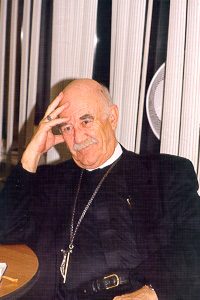You may have forgotten that Korby was not a district president, was not a voice sought out by the leaders of our church, and was not a theologian recognized or welcomed by his own church. He was not a lone voice but he was among the lonely who advocated for such things as eucharistic integrity in the life of the Church, private confession, and, yes, pastoral integrity. His gravely voice agitated at a time when the Lutheran Church was fighting battles on many fronts and did not want or think it needed another cause. He was absolutely correct in his estimation of what was wrong among us but we as a church were not willing to hear or heed his voice in correcting that wrong.
Kenneth Frederick Korby was ordained on the Feast of St. James the Elder in 1948 at Redeemer Lutheran Church, St. Paul, Minn., where he served as Assistant Pastor under another notorious name in Missouri, Herbert Lindemann. He grew up during the Great Depression, living a simple life on a farm where the simple piety of Bible, catechism, and hymnal instilled in him a frame for his faith that never left him. He carried this with him to Medford, Oregon -- hardly the rich ground of Lutheranism even then, and then went to Valpo (yes, that pariah of schools among LCMSers) where he stayed from 1958-1980. He was the first celebrant in the magnificent chapel that dominates the skyline of the campus. He spent 9 years at Chatham Fields Lutheran Church, a largely African-American congregation on the southside of Chicago. His degrees were from Concordia Seminary, Yale, and Seminex (yes, Seminex). Dr. Korby led no charmed life. Those who would heed his words must also prepare to live something less than a charmed life.
I knew Dr. Korby, listened to him speak, and revered him as a prophet and pastor -- but the picture of a pastor and the shape of the kind of ministry encouraged by this sainted pastor both attracted and frightened me. It should. We should all want to be the kind of man Pastor Kenneth Korby was but we should do so with no illusions. Our congregations do not want a man who holds forth the witness of our Confessions as the holy ground on which we stand and that which shapes our doctrine and practice. It is a dangerous road for those whose weakness is wanting to be liked and loved. We have lived too long in a culture of go along and get along. To be a man, as Dr. Korby calls us, is to risk comfort in order to be faithful. You may opine at length about the state of things in our Synod and the treatment of pastors by congregations and DPs who prefer those moderate in faith and practice but you must also look at the ranks of those who have battle scars and checkered resumes to evidence the cost of faithfulness.
It is not just that pastors need to be men but congregations need to want and welcome and listen to them. The Church cannot survive against the pressures of the devil and the world and give into the darker voices in us that demand a relative truth, a flexible faith, and a compromised practice. The LCMS is not the ELCA but we are not without those who wish we were closer to them than to the kind of Lutherans who say what they mean and mean what they say. Pastors need to be there for the long haul to make a difference and willing to put up with a great many things to lead a congregation to become more Lutheran in identity as well as in confession and practice.
I have served two parishes (not much experience there!) but neither parish was confessional in faith nor did either parish have a history or strong identity in the Divine Service, catechism, and creed. One did not even use a Lutheran hymnal and the other had lay people doing most of the liturgy so that the pastor was there only for essentials. Both places took time to begin to make a difference. I made so many mistakes that it is a wonder anything good came of it all. Both parishes still have those who would rather appeal to broad minimums of practice and belief and both parishes are but a half of a generation from bowing the pressure to root faith in feelings, worship in what is fun and meaningful, and parish life in what will appeal to outsiders. Private confession is still a practice in its infancy here but it is growing up slowly. There are naysayers who always challenge with "that is not how I was taught" or "that is not what I like" and there will always be. COVID has exposed all the cracks in our foundation and threatens to make us all smaller unless we are willing to grant a digital church legitimacy.
So, quote Korby, by all means, but quote him knowing that the path he lived and his legacy is not without challenge. In the end you will be tested and tried. It may not be so much how manly you are as how much you are willing to put up with and for how long before the churches we speak of in theory become close to the churches we have in fact. But faithfulness is not about what you judge to be worth the fight. It is always about what God calls, what our heroes in the faith have stood for, and whether we will follow in their train.

No comments:
Post a Comment